November 19, 2025 | 01:59 GMT +7
November 19, 2025 | 01:59 GMT +7
Hotline: 0913.378.918
November 19, 2025 | 01:59 GMT +7
Hotline: 0913.378.918
In modern society, activated carbon has been very popular and widely applied in people's lives thanks to its useful features and uses. Accordingly, activated carbon is an indispensable ingredient in pure water treatment technology, they are also used in cosmetics, facial cleansers, bath oils, skin care masks to disinfect, absorb dirt and toxins from pores. Activated carbon is also added to toothpaste to absorb plaque and bacteria. Medical masks and respirators also have activated carbon in them.
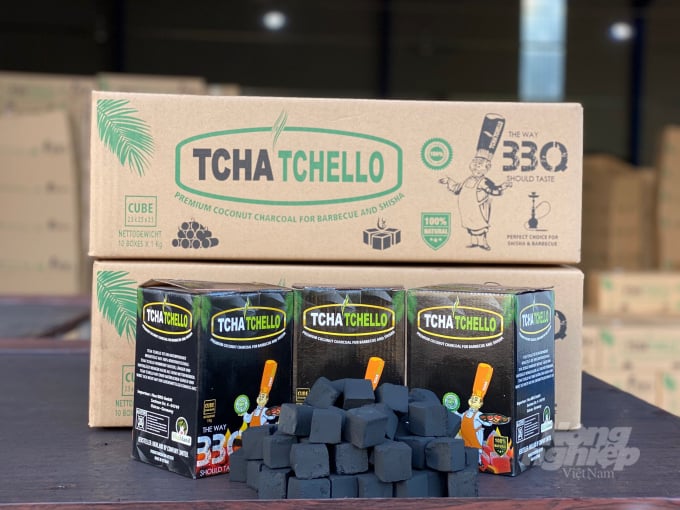
Activated carbon from coconut shell is one of the best charcoal currently available and has high applicability. Photo: Tran Trung.
The main component of activated carbon is carbon that is heated and activated at a very high temperature in an anaerobic environment. Materials commonly used to make activated carbon can be: rice husk, rice, coconut shell, bamboo, wood, etc. However, coconut shell is a best raw material for the production of activated carbon because coconut shell is hard and contains high carbon content.
“Ben Tre is famous for being the land of coconuts, although I was born and raised in Binh Phuoc, I know that activated carbon from coconut shells is produced by many countries around the world and considers it as “black gold”. Meanwhile, the source of coconut shell material in Vietnam is very abundant. So why don't I turn it into foreign currency, helping my farmers to a better life using family coconut gardens?", Nguyen Thi Cam Hang - Director of Binh Phuoc Highland Company shared on the profession of making activated carbon.
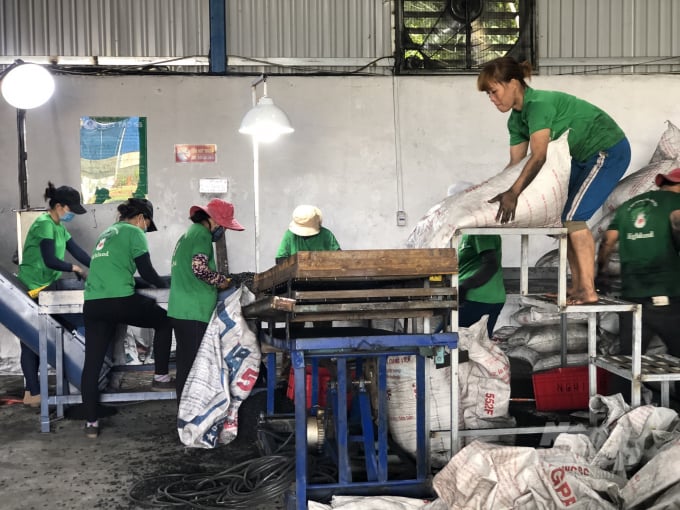
The raw material production base is located in Ben Tre province, the main raw material area of the company. Photo: Tran Trung.
According to Ms. Hang, before becoming one of the first female entrepreneurs to bring Vietnamese activated carbon to the world market, she worked in the banking sector. After years of striving, she holds the position of Deputy Director of a bank branch in Ho Chi Minh City. However, afterwards, she stepped into a field not within her forte, which is activated carbon. With her new job, she faced many difficulties, but with bravery and passion, she was determined not to give up. Currently, she owns a company specializing in activated carbon production with a factory scale of over 11,000m2, exporting nearly 200 tons of carbon products to the world market every month, mainly in the Middle East.
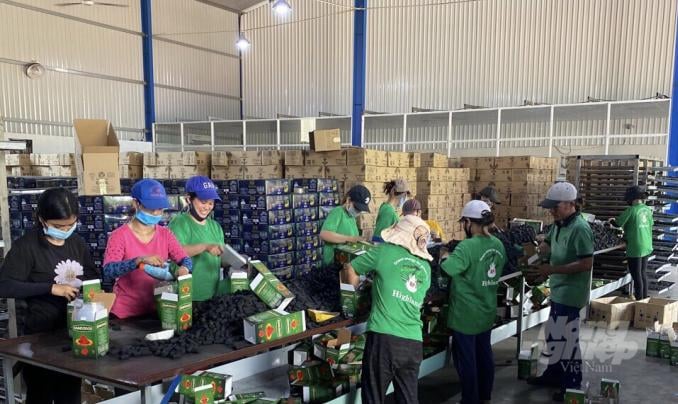
Inside the coal packing factory in Binh Phuoc. Photo: Tran Trung.
“In 2014, I started making coconut shell charcoal, from renting production space with nearly 30 workers and a capacity of about 30 tons/month. When I entered, I found this to be a business that brings many benefits to the community. It utilizes agricultural waste, which is desiccated coconut shells, so it does not need to exploit natural resources. Meanwhile, clean energy is the current world trend and Vietnam is highly appreciated for its ability to produce coconut shell charcoal. With this position, if done well, it will quickly find an output market. Having a business mind, I saw the opportunity and decided to start this industry from there”
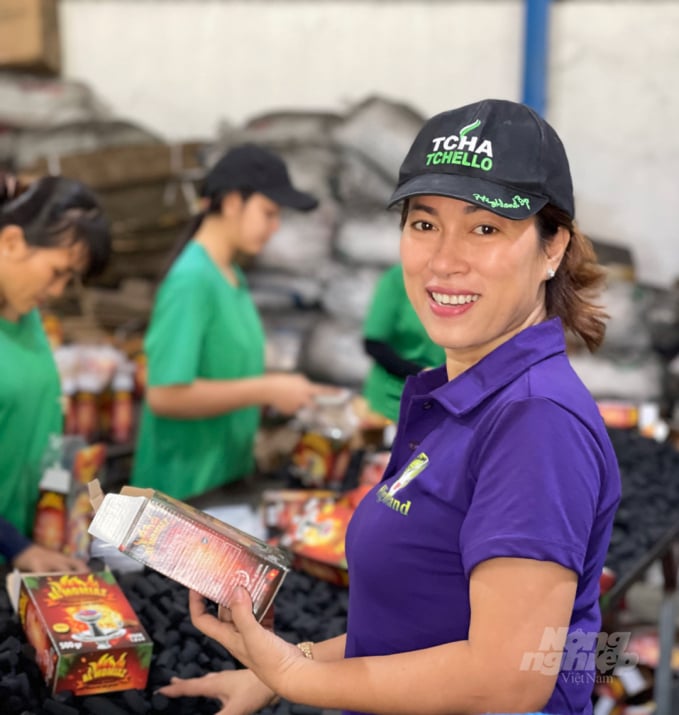
Ms. Nguyen Thi Cam Hang with the product she worked hard to cultivate and build. Photo: Tran Trung.
In May 2018, coconut shell carbon produced by Ms. Hang began to receive positive feedback from customers and orders were increasing day by day. Management of production businesses requires closeness and timeliness to increase the competitiveness of products. Meanwhile, banking management also needs to be focused and handled in a timely manner to ensure that business targets, safety norms in credit activities, and bad debt settlement targets are met. "Faced with a choice, I decided to resign from the bank and devote all my energy to this business that brings many benefits to the community," Ms. Hang shared.
According to Ms. Hang, the company's work is developing smoothly, in 2020 the Covid-19 pandemic broke out, causing business challenges. Being a major export enterprise, logistics activities are disrupted, causing goods to stagnate at the port, adding to the scarcity of containers, uncontrollably rising shipping rates, increasing product consumption prices, affecting revenue. In addition, the control activities for domestic transportation such as Covid-test for drivers, transportation procedures ... delay the transportation of input materials, labor to the port, delay in packaging delivery schedule, and competition opportunities with other products in the market has decreased sharply. Once again, the bravery and depth of knowledge in the process of working in the banking sector were utilized. She quickly turned a threat into an opportunity and steered the company into a new, more sustainable, and more successful development direction.
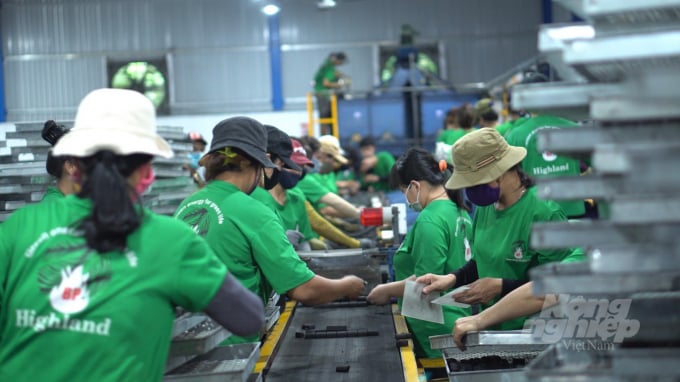
The company's production line is invested with modern technology and equipment that is competitive enough to meet export standards. Photo: Tran Trung.
Accordingly, Ms. Hang decided to invest and import the German technology "Charcoalization furnace by isolation pyrolysis" to produce high quality coconut shell charcoal, producing environmentally friendly biochar pellet.
The outstanding advantage of the technology is the high carbonization rate; high product recovery efficiency; heat recovery during pyrolysis reuse provides heat for pyrolysis, saving 70% of fuel consumption and recycling 95% of emissions, combinng filtration system to extract tar and wood vinegar mixed in the smoke through the process of condensing the exhaust smoke... The application of charcoalization technology by means of isolation pyrolysis helps to shorten the production process, reduce labor costs, products with superior quality compared to similar products on the market, contributing to a great indirect value increase for the coconut product processing industry, creating added value and making an important contribution to the coconut value chain.
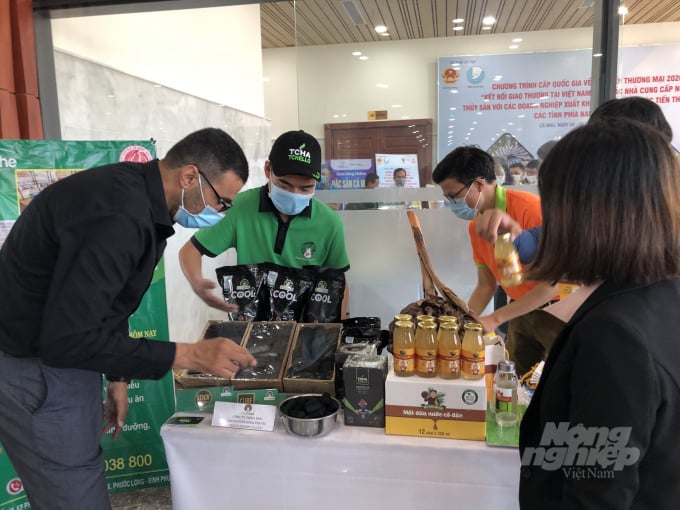
The company's products are studied and signed by many partners from fastidious markets such as Europe and the US. Photo: Tran Trung.
On the other hand, with knowledge of economics and finance, having worked with many customers in many fields, and good foreign language skills, she quickly connected to find new markets. Thanks to her understanding of international payment operations with benefits and risks, it has helped her negotiate with partners and sign new contracts from potential markets such as Korea, the US and Europe. ... avoiding dependency on Middle Eastern countries.
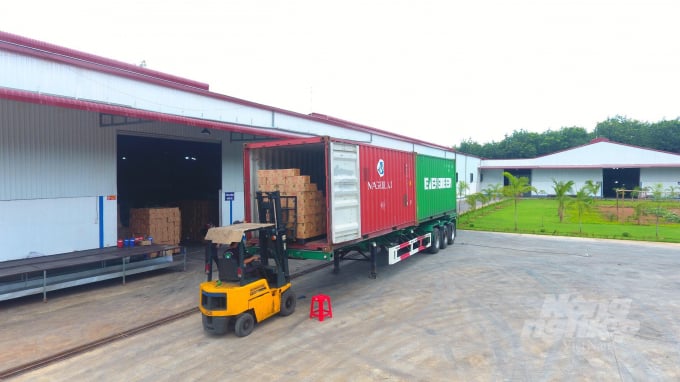
The company's products have overcome the Covid-19 challenge to export. Photo: Tran Trung.
“Now that the pandemic situation has begun to be under control, many provinces and cities are returning to a new normalcy, we are starting to speed up production to deliver goods to our partners in time, thanks to the new production line, the factories' capacity increases twofold, meeting 12-15 containers/month. Currently, export output accounts for 99%, but in the future, we will strengthen the domestic distribution channel, so that Vietnamese people can use Vietnamese charcoal with high quality, " said Ms. Hang.
Translated by Nguyen Hai Long

(VAN) Integrating agricultural extension activities with ecotourism development unlocks promising new avenues for localities boasting specific advantages in grape and apple cultivation.

(VAN) Enterprises and cooperatives accompany farmers in Tay Ninh to develop an organic seedless lime growing area, paving the way for poverty reduction.

(VAN) There were times when Pho faltered, yet his aspiration to bring the pure aroma to those who truly value clean tea kept urging him forward.

(VAN) Bich Thao Coffee Cooperative pioneered products achieving the national 5-star OCOP standard, paving the way for Son La coffee to conquer international markets.

(VAN) The Bao La bamboo-and-rattan cooperative has been producing goods integrated into value chains. As a result, its products have reached global markets.

(VAN) The training course in An Giang equips learners with emission verification methods, thus creating a basis for low-emission rice production.

(VAN) Thu Lum commune is focusing on developing medicinal plants under the forest canopy, creating sustainable livelihoods for local people, and contributing to protecting the ecological environment.